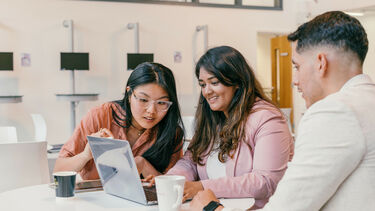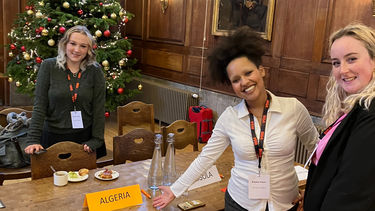Providing new and unique perspectives on climate issues

So, Scarlett, what is the BISA Climate Simulation?
Scarlett: The BISA Climate Summit is a simulation of the negotiations between countries at climate events, like the COP conferences. You get assigned a country to represent in pairs, and you have to try to help secure an agreement that benefits your country and would facilitate a stop to climate change.
What made you want to take part in this event?
Scarlett: I wanted to participate in the simulation as it seemed like a fun opportunity to develop my knowledge of climate issues and improve my negotiating skills. I was already particularly interested in how climate change affects countries in the Global South that shoulder less blame for the problem but often face more of the consequences and how they go about negotiating with less leverage. Getting to be Algeria allowed me to learn a lot more about this.
Kaydian, you and Scarlett were Team Algeria, what did your team get up to?
Kaydian: We argued that a large amount of our emissions are exported to Europe and therefore the EU should have to bear that responsibility. Within basket 2 we managed to convince Vietnam and Mexico to make more reductions than Algeria because coal and oil are major components of Algeria's economy and decarbonising would be very expensive for us. Both those nations could decarbonise for less money and their economies do not rely on natural gases. Basket 2 came to an agreement fairly quickly and then all baskets came together as a group and worked on convincing China to reduce their CO2 more so we could reach our target.
Did you enjoy representing Algeria?
Kaydian: I enjoyed representing Algeria because it allowed me to utilise my knowledge of colonialism and its effects in my negotiations. It was really interesting getting into the mindset of a country where natural gases make up a large portion of the economy. It provided me with a different perspective on climate issues as we had to consider how the economy would be affected by these climate-positive changes.
Rose, you were on Team Russia. How did you negotiate while staying true to Russia’s diplomatic reputation?
Rose: We were a contentious figure throughout the day! Our behaviour can be summarised as continuously blaming Western countries for climate change, expressing solidarity with the BRICS countries, and our ‘right’ to invade Ukraine. These beliefs didn’t necessarily reflect our own, but I believe we represented Russia accurately.
What do you think you got out of the whole experience?
Rose: My biggest takeaway from the event was how slow and frustrating negotiations can be. Theoretically, I understood the complexity of diplomacy, however, engaging in simulation showed me that agreements are reached even slower than I realised. My experience of this event will inform my future thinking on climate diplomacy. I hope to one day work in international climate politics, so I believe this experience will be very useful in my career.
What was your favourite moment of the simulation?
Rose: My favourite moment from the simulation was the prizes. Me and Arran won a prize for our portrayal of Russia, and it was so nice to feel validated for the hard work we’d put into the day. It was also great to see the other Sheffield team win a prize for their portrayal of Algeria, as they had also worked hard and had performed amazingly throughout the day. I think it meant a lot that we’d won two prizes for the University!
Kaydian, what was your favourite moment?
Kaydian: My favourite moment of the simulation was when we were negotiating in our group and had decided on a plan to meet our target. It felt so fulfilling to finally get an agreement. There were two countries I was not convinced we were going to pledge as I had spent a long time trying to convince them and they still seemed slightly unsure. When we went around the room saying our pledges they both pledged the right amount which meant we had met our target. I felt so happy we managed to negotiate successfully and reach our target.
Scarlett?
Scarlett: My favourite moment from the simulation was securing an agreement for all the basket two countries, which allowed us to meet our goal and announce it to the chairperson. It was fun running around negotiating with other teams and gratifying to announce the deal we’d engineered to the chairperson and make a big change to the negotiations. Winning the distinguished delegation prize as part of the Algerian pair was also great!

International postgraduate taught scholarships
We offer a generous package of financial support for international postgraduate taught students, including scholarships worth £10,000 towards the original tuition fee.
Applications are open for existing offer holders for a postgraduate taught programme starting in September 2025.


